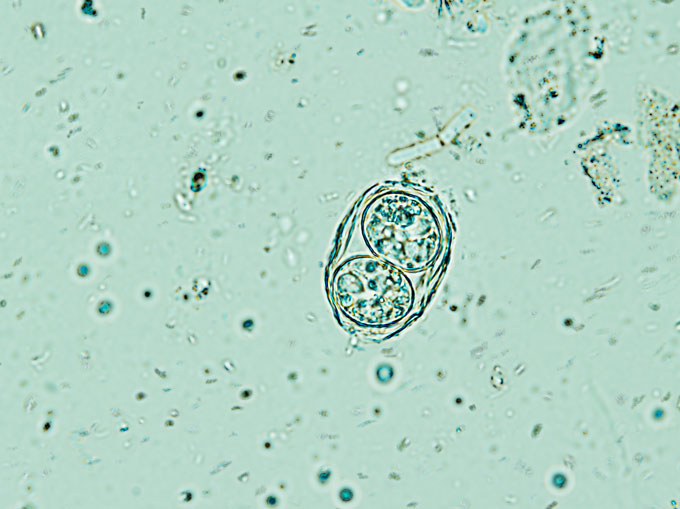[ad_1]
A parasite is likely to be driving some wolves to guide or go solo.
Wolves in Yellowstone Nationwide Park contaminated with Toxoplasma gondii make more daring decisions than their uninfected counterparts, researchers report November 24 in Communications Biology. The wolves’ enhanced risk-taking means they’re extra more likely to depart their pack, or change into leaders of their very own.
“These are two choices that may actually profit wolves, or might trigger wolves to die,” says Connor Meyer, a area biologist on the College of Montana in Missoula. The findings reveal a parasite’s potent potential to affect a wolf’s social destiny.
Illness is commonly thought of vital for wildlife, largely within the context of killing its host, Meyer says. “We now have proof now that simply being contaminated with a sure parasite — Toxoplasma — can have fairly main implications for wolf habits.”

Single-celled T. gondii has a observe report of altering animal habits. Its most vital hosts are cats, which give a breeding floor for the parasite of their small gut. The parasite offspring hitch a experience on feline feces. Different animals then ingest the parasite, which then manipulates its new hosts’ habits by tweaking sure hormones, making the hosts bolder or extra aggressive. Contaminated mice, for instance, can fatally lose their fear of cats, permitting the parasite to contaminate extra hosts as soon as the mice are consumed (SN: 1/14/20).
In Yellowstone Nationwide Park, many wolves are additionally infected with T. gondii, current analysis has proven. So Meyer and colleagues puzzled if grey wolves (Canis lupus) within the park confirmed any parasite mind-bending of their very own.
Wolves had been reintroduced to Yellowstone in 1995. Ongoing examine of the park’s packs meant that the researchers had entry to about 26 years’ value of blood samples, behavioral observations and motion knowledge for 229 of the park’s wolves.
The workforce screened the wolf blood for antibodies in opposition to T. gondii parasites, which reveal an an infection. The researchers additionally famous which wolves left their pack — often a household unit consisting of a breeding pair and their offspring — or turned a pack chief.
Each are high-stakes strikes for a wolf, Meyer says.
Contaminated wolves had been 11 instances as seemingly as noninfected wolves to disperse from their pack, the workforce discovered, and about 46 instances as more likely to finally change into leaders. The findings slot in with T. gondii’s obvious potential to spice up boldness throughout a variety of warm-blooded life.
From astronomy to zoology
Subscribe to Science Information to fulfill your omnivorous urge for food for common information.
The examine fills an important hole within the Toxoplasma pool of information, says Ajai Vyas, a neurobiologist at Nanyang Technological College in Singapore, who was not concerned with the examine.
“A lot of the earlier work has been accomplished within the lab,” Vyas says. However there are limitations to that method, particularly for re-creating how animals expertise the results of the parasite of their pure surroundings. Such analysis has “change into nearly like learning whale swimming habits in yard swimming pools; [it] doesn’t work very nicely.”
Wolves’ enhanced boldness could even kind a suggestions loop, the workforce proposes. The researchers discovered that not solely do cougars (Puma concolor) within the park carry the parasite, however wolves’ an infection charges had been highest when the animals’ ranges overlapped with the park’s densest aggregations of cougars. Contaminated wolf leaders could also be extra more likely to carry pack members into riskier conditions, together with approaching cougar territories, making further infections extra seemingly.
The feedback-loop thought is “very fascinating,” however extra analysis is required to verify it, says Greg Milne, an epidemiologist on the Royal Veterinary School in London, who was not concerned with the examine. Such analysis could contain figuring out if contaminated wolves usually tend to migrate into an space with extra cougars.
“I believe individuals are simply beginning to actually recognize that character variations in animals are a significant consideration in habits,” says examine coauthor Kira Cassidy, a wildlife biologist on the Yellowstone Wolf Undertaking in Bozeman, Mont. “Now we add a parasite-impacting habits to the checklist.”
Subsequent, the workforce is fascinated by inspecting the long-term penalties of a T. gondii an infection, and whether or not contaminated wolves make higher leaders or dispersers than uninfected wolves.
It’s additionally not identified how an infection impacts survival and copy charges, Cassidy says. “An infection could very nicely be detrimental in some methods and advantageous in others.”
[ad_2]
Source link
